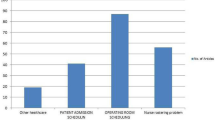Abstract
In this paper, a comparison and validation of various priority rules for the Integrated Physician Rostering and Surgery Scheduling Problem (IPSSP) under different objective functions is made. We integrate three constructive heuristic types with two corresponding priority rule classes in order to obtain a solution for the combined physician rostering and surgery scheduling problem. Twelve priority rules for the surgery assignments and six priority rules for the physician rostering are used to schedule the surgeries in the operating theatre on a weekly basis, while generating adequate rosters for the physicians that maximizes their preferences. Our goal is to provide a suitable heuristic for every problem type, problem size and problem structure for the hospital manager to use in every possible condition. The problem type represents the most occurring objectives and goals according to literature. The problem size depicts the size of the hospital and its corresponding utilization. The problem structure defines the different demands of the physician roster and the surgery schedule. It can be shown that for every situation a fitting heuristic can be provided. These high-quality decomposition-based constructive heuristics can also be used in meta-heuristics to generate good solutions. Most importantly, we have established general recommendations with respect to the use of the different proposed heuristics in different hospital settings.


Similar content being viewed by others
References
Artigues C, Lopez P and Ayache P (2005) Schedule generation schemes for the job-shop problem with sequence-dependent setup times: dominance properties and computational analysis. Annals of Operations Research 138 (1), 21–52.
Beliën J and Demeulemeester E (2008) A branch-and-price approach for integrating nurse and surgery scheduling. European Journal of Operational Research 189 (3), 652–668.
Cardoen B, Demeulemeester E and Beliën J (2010) Operating room planning and scheduling: a literature review. European Journal Of Operational Research 201 (3), 921–932.
Fei H, Chu C, Meskens N and Artiba A (2008) Solving surgical cases assignment problem by a branch-and-price approach. International Journal of Production Economics 112 (1), 96–108.
Guerriero F and Guido R (2011) Operational research in the management of the operating theatre: a survey. Health Care Management Science 14 (1), 89–114.
Guinet A and Chaabane S (2003) Operating theatre planning. International Journal of Production Economics 85 (1), 69–81.
Hans E, Wullink G, van Houdenhoven M and Kazemier G (2008) Robust surgery loading. European Journal of Operational Research 185 (3), 1038–1050.
Haupt R (1989) A survey of priority rule-based scheduling. OR Spectrum 11 (1), 3–16.
Jebali A, Hadj Alouane A and Ladet P (2006) Operating rooms scheduling. International Journal of Production Economics 99 (1–2), 52–62.
Kolisch R and Sprecher A (1996) PSPLIB – a project scheduling problem library. European Journal of Operational Research 96 (1), 205–216.
Litvak E and Long MC (2000) Cost and quality under managed care: irreconcilable differences? The American Journal of Managed Care 6 (3), 305–312.
May JH, Strum DP and Vargas LG (2000) Fitting the lognormal distribution to surgical procedure times. Decision Sciences 31 (1), 129–148.
Meskens N, Duvivier D and Hanset A (2013) Multi-objective operating room scheduling considering desiderata of the surgical team. Decision Support Systems 55 (2), 650–659.
Min D and Yih Y (2010) Scheduling elective surgery under uncertainty and downstream capacity constraints. European Journal of Operational Research 206 (3), 642–652.
OECD (2012) OECD health data 2012. [WWW document] http://stats.oecd.org/index.aspx?DataSetCode=HEALTH_STAT (accessed 1 September 2014).
Panwalkar S and Iskander W (1977) A survey of scheduling rules. Operations Research 25 (1), 45–61.
Roland B, Martinelly CD, Riane F and Pochet Y (2010) Scheduling an operating theatre under human resource constraints. Computers & Industrial Engineering 58 (2), 212–220.
Roland B and Riane F (2011) Integrating surgeons’ preferences in the operating theatre planning. European Journal of Industrial Engineering 5 (2), 232–250.
Stepaniak PS, Heij C, Mannaerts GH, de Quelerij M and de Vries G (2009) Modeling procedure and surgical times for current procedural terminology-anesthesia-surgeon combinations and evaluation in terms of case-duration prediction and operating room efficiency: a multicenter study. Anesthesia & Analgesia 109 (4), 1232–1245.
Strum D, Vargas L and May J (1999) Surgical subspecialty block utilization and capacity planning. Anesthesiology 90 (4), 1176–1185.
Van Huele C and Vanhoucke M (2014) Analysis of the integration of the physician rostering problem and the surgery scheduling problem. Journal of Medical System 38 (6), 1–16.
Author information
Authors and Affiliations
Corresponding author
Rights and permissions
About this article
Cite this article
Van Huele, C., Vanhoucke, M. Decomposition-based heuristics for the integrated physician rostering and surgery scheduling problem. Health Syst 4, 159–175 (2015). https://doi.org/10.1057/hs.2014.27
Received:
Revised:
Accepted:
Published:
Issue Date:
DOI: https://doi.org/10.1057/hs.2014.27




